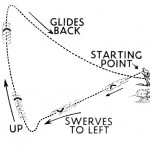In recent days the issue of the want of rational coherence of evolutionary materialist scientism has become a major focus at UD. For cause.
In the most recent thread on it, BA says in the OP:
I had an epiphany today. I think, after all this time, I finally get it . . . .
Eigenstate intends for us to believe that intentional states do not exist.
Eigenstate desires for us to believe that desires do not exist.
Eigenstate believes (and asks us to believe) that beliefs do not exist.
Eigenstate wants us to know that the word “I” in the sentence he just wrote (i.e. “I encourage any and all . . .”) maps to an illusion – i.e., his illusory perception that he has subjective self-awareness.
All of this is, of course, monstrously idiotic and logically incoherent. If it were true it would undermine rationality itself, and no sane person believes any of it is true, including eigenstate himself. Yet he says it anyway.
WHY?
Here is where I had my epiphany. Eigenstate says it not because he believes it (it is not possible for a sane person to believe it). He says it because he must say it, because he is dedicated to eliminative materialism despite the patent absurdity of its entailments.

Before my epiphany I had always labored under a false assumption about human nature. I assumed that if anyone asserted a proposition they later learned was logically incoherent, they would choose logic and abandon the proposition. I was wrong. With true believers like eigenstate – fundamentalist materialist if you like – the materialism comes first. Reason and logic be damned. They are willing – even eager it seems – to drive a stake through the heart of rationality itself in order to cling to their religious beliefs (i.e., eliminative materialism). I won’t make that mistake anymore.
Here’s the irony of it all. I am all but certain that eigenstate has mocked irrational religious fundies . . .
What is the response?
Try, longtime objector G2:
G2, 12: Can I take it that this blog is no longer about ID ?
To this, I replied:
KF, 15: Reason is foundational to argument and intelligence; thence, to intelligently directed configuration, aka design. If we are dealing with an ideology that is perfectly willing to burn down the temple of reason itself rather than yield the point that it is manifestly self-referentially incoherent, self-falsifying and self-refuting on its own declarations [I think I am going to headline this] . . . see how hard I have to work to hammer home the point . . . them we need to show it. And so, your current talking point line on how UD is irrelevant to design issues collapses yet again. Not that — per long track record — that will make much of a difference to the rhetorical games afoot. KF
PS: If you are interested in a current technical thread, try this one, which parallels things elsewhere: https://uncommondescent.com…..obability/
So, now, let me proceed to headline and augment for record, the comment in question as linked:
__________________
KF, Hay thread 33: >> It is worth the while to ponder Tim H of Rational Thoughts on self-refuting arguments:
_____________________

>>In his Introduction to Logic, Harry Gensler defines a self-refuting [= self-referentially incoherent, and so self-falsifying . . . ] statement as “[A] statement that makes negative claims so sweeping that it ends up denying itself.” [1] In other words, it results when an argument or position is undercut by its own criteria (An example of this would be saying, “I cannot speak a word of English” in English). Off the top of my head and in no particular order, here’s a grab-bag of several self-refuting positions which I’ve documented over the years:
1] Truth does not exist (Is that a true statement?)
2] Nothing is absolute (Is that absolutely true?)
3] I do not exist (You must exist to deny that you exist)
4] Science is the only way to know (Can you scientifically prove that?)
5] Only what can be perceived by the five senses exists (Can you prove that by the five senses?)
6] Nobody can know anything for sure (Do you know that for sure?)
7] Nobody can know anything about God (How do you know that?)
8] Talk about God is meaningless (Since it is a statement about God, this statement is meaningless too)
9] Reality is just your interpretation, objective reality does not exist (That’s just your interpretation)
10] “‘Everything we think and do is the function of our genes/nervous system’”: Is this belief itself just the result of genetic/neutral activity? If so, why trust it — or any belief we have? If your belief happens to be right, it’s just by accident” [2]
11] There are no beliefs (You expect me to believe that?) [3]
12] Everything is meaningless (So is that statement)
. . . .
Notes:
[1] – Harry J. Gensler, Introduction to Logic (New York, NY: Routledge 2002)p:396
[2] – Paul Copan, Loving Wisdom: Christian Philosophy of Religion (Danvers, MA: Chalice 2007) p.62
[3] – Victor Reppert, C. S. Lewis’s Dangerous Idea (Downers Grove, IL: InterVarsity 2003)p.75>>
_____________________
Lewontin-Sagan style (and Marxist style, and Freudian style and Skinner-style and village/new atheist style . . . ) a priori evolutionary materialist scientism falls into this category by implying an account of reality from hydrogen to humans by blind chance and mechanical necessity that leads to humans in ways that implicitly reduce mindedness to an unintended effect of forces and factors irrelevant to purpose, truth, validity, right/wrong etc. That is it is a case of inadequate cause. As a direct result, Darwin’s musings on whether one should trust the deliverances of a monkey’s mind come back around and boomerang on it.
Thus we see the force — again — of Haldane:
“It seems to me immensely unlikely that mind is a mere by-product of matter. For if my mental processes are determined wholly by the motions of atoms in my brain I have no reason to suppose that my beliefs are true. They may be sound chemically, but that does not make them sound logically. And hence I have no reason for supposing my brain to be composed of atoms. In order to escape from this necessity of sawing away the branch on which I am sitting, so to speak, I am compelled to believe that mind is not wholly conditioned by matter.” [[“When I am dead,” in Possible Worlds: And Other Essays [1927], Chatto and Windus: London, 1932, reprint, p.209.]
. . . and Reppert:
. . . let us suppose that brain state A, which is token identical to the thought that all men are mortal, and brain state B, which is token identical to the thought that Socrates is a man, together cause the belief that Socrates is mortal. It isn’t enough for rational inference that these events be those beliefs, it is also necessary that the causal transaction be in virtue of the content of those thoughts . . . [[But] if naturalism is true, then the propositional content is irrelevant to the causal transaction that produces the conclusion, and [[so] we do not have a case of rational inference. In rational inference, as Lewis puts it, one thought causes another thought not by being, but by being seen to be, the ground for it. But causal transactions in the brain occur in virtue of the brain’s being in a particular type of state that is relevant to physical causal transactions.
But of course, such will predictably fall on deaf ears, i.e. we see the fallacy of the ideologised, closed mind at work.
Feser explains why:
A reader writes to inform me of Alex Rosenberg’s very interesting essay “The Disenchanted Naturalist’s Guide to Reality.” Rosenberg’s thesis? That naturalism entails nihilism; in particular, that it entails denying the existence of objective moral value, of beliefs and desires, of the self, of linguistic meaning, and indeed of meaning or purpose of any sort. All attempts to evade this conclusion, to reconcile naturalism with our common sense understanding of human life, inevitably fail. Naturalism, when consistently worked out, leads to a radical eliminativism. Says my informant: “Why, it sounds shockingly similar to some things you once wrote in a book that was all about sperm, does it not?” Indeed, except that when I said it I was a “religiously inspired bigot,” whereas when Rosenberg says it he gets a respectful link, complete with a fanboyish exclamation point. Odd, no?
Not really. Because in The Last Superstition I argue that the implications in question constitute a reductio ad absurdum of naturalism, whereas Rosenberg (who is himself a naturalist) regards them instead as a set of depressing truths we must learn to live with. As you’ll see from Rosenberg’s combox, not all naturalists agree with him. But naturalist religionists are an ecumenical bunch. They’ll allow you to draw any absurd conclusion you wish from naturalist premises, as long as (naturally enough) you never under any circumstances question the premises themselves.
As TLS argues at length, the position Rosenberg rightly takes to follow from naturalism is not only depressing; it is incoherent. Therefore, naturalism is false. Furthermore (and as I also argue at length in TLS) there are no non-question-begging arguments for naturalism in the first place. Its hegemony over contemporary intellectual life owes entirely to a mixture of philosophical muddleheadedness, ignorance of philosophical history, and anti-religious animus . . . .
Suppose (as I argue in TLS) that Rosenberg is right about what naturalism implies. In that case there are no beliefs or desires, nor is there any such thing as the “original intentionality” or meaning that common sense says thoughts have, and which it takes to be the source of the derived intentionality exhibited by language. But then, Rosenberg rightly concludes, there’s no such thing as “the” real or actual meaning of a work of art, a human action, or indeed of anything else. There is simply no fact of the matter about what anything means. So far so good, and so far what Rosenberg is doing is simply noting that Quine’s famous thesis of the indeterminacy of meaning is not some eccentricity on Quine’s part, but follows from the naturalistic assumptions Quine shares with most contemporary academic philosophers.
The trouble is that if this is correct, then there is in particular no fact of the matter about what Rosenberg or any other naturalist means when he puts forward a naturalistic thesis. Objectively speaking there is no more reason to think that their utterances express a naturalistic position than that they express a Cartesian one or an Islamic one, or indeed that they are anything more than empty verbiage. The choice is purely pragmatic, or determined by social or economic forces or toilet training, or by Darwinian selection pressures, or by whatever it is this year’s clever young naturalistic philosophers are saying determines it.
Now this is absurd enough, but naturalists have already long inured themselves to accepting such nonsense. Writers like John Searle have been pointing out the paradox for years, to no effect. It doesn’t phase the average naturalist, any more than the hardened criminal feels even a twinge of guilt upon committing his 345th felony. The mental calluses are too thick. You see, if naturalism leads to absurdity, then it must not really be absurdity; because, kids, naturalism just can’t be wrong. Only those dogmatic religious types think otherwise. [–> notice, the implication, reasoning in a closed minded, self-falsifying circle of a priori evolutionary materialistic scientism . . . . i.e. a closed mind can be closed to the exposure of glaring fallacies, to the point where questions of systematically indoctrinated Plato’s Cave style shadow shows confused for unquestionable realities have to be raised.]
{Insert: The Parable of Plato’s Cave:}
[youtube d2afuTvUzBQ]
But it’s worse than all that. For it won’t do for the naturalist to say: “OK, so we’ve got to swallow some bizarre stuff. But we’re just following the argument where it leads!” What argument? There’s no fact of the matter here either – no fact of the matter about which argument one is presenting, and in particular no fact of the matter about whether one’s arguments conform to valid patterns of inference. In the case at hand, there is simply no fact of the matter about whether Rosenberg’s own arguments (or those of any other naturalist) are sound or entirely fallacious. So why should we accept them? I suppose Rosenberg could always do what any serious philosopher would when dealing with those who stubbornly disagree with him – start a petition to pressure the APA to settle the question in his favor. But until that happens, we’ll just have to wait on pins and needles.
So, that’s one fatal problem . . . . There are other incoherencies too. For example, Rosenberg keeps telling us that this or that commonsense feature of human nature is an “illusion” – despite the fact that illusions themselves are intentional phenomena, and thus the sort of thing which, on Rosenberg’s account, naturalism entails doesn’t exist. Rosenberg also seems to think that blindsight phenomena give us a reason to be eliminativists about phenomenal consciousness. But this is incoherent too, because the only reason we judge something to be a case of blindsight in the first place is that we have phenomenally conscious experiences to compare it to. Furthermore, Rosenberg assures us that the mind is merely the product of a long process of selection which favored those who were skilled at detecting other people’s motives. But since “motives” are themselves intentional mental phenomena, they can hardly coherently be appealed to in an account of how the mind originated. (Nor will it do to suggest that Rosenberg means only that our more complex minds evolved in order to detect other people’s motives; for it is the existence of any intentionality at all which poses a uniquely difficult problem for naturalism, not merely the existence of complex minds like ours.)
Of course, these are very old and very well-known problem with eliminative materialism, and eliminative materialists typically pooh-pooh them or (more commonly) simply ignore them. Even non-eliminativist naturalists do the same. What none of them do is actually answer such objections, except with “solutions” which also presuppose intentionality and/or consciousness and thus simply raise the same difficulty at a higher level. The problem is obvious, and obviously fatal, and yet amazingly, it is rarely addressed (Rosenberg’s essay completely ignores it). Victor Reppert and William Hasker have put forward what I think is the correct explanation of this bizarre state of denial: Even naturalists who are not eliminative materialists suspect that their position may inevitably lead them in an eliminativist direction, and they want to keep the option open. Precisely because the obviously fatal objection to eliminative materialism is so obvious and so fatal, the typical naturalist pays it little or no heed, lest he be forced by it to give up naturalism itself – a position which is, as Hasker puts it, something like “a theological dogma” for those philosophers committed to it. Like children, they hope the problem will just go away if they pay it no attention . . . [there’s a lot more!]
Sobering.
But, food for thought — at least for those not content to chase their tails in a closed, self-falsifying loop of thought on a view that undermines even the possibility of rational thought.
 There comes a point where someone needs to point out that The Emperor is parading around stark naked and everyone around him is pretending otherwise, to protect the system of mutually supportive interests. (Remember, in the old story, the tailors said that their magic cloth was an incompetence detector, i.e. if you were incompetent you could not see it. And so, from the Emperor himself down, they swallowed and institutionalised foolishness rather than first demand demonstration of the power to make such a detector. Thus, proving . . . their incompetence . . . )
There comes a point where someone needs to point out that The Emperor is parading around stark naked and everyone around him is pretending otherwise, to protect the system of mutually supportive interests. (Remember, in the old story, the tailors said that their magic cloth was an incompetence detector, i.e. if you were incompetent you could not see it. And so, from the Emperor himself down, they swallowed and institutionalised foolishness rather than first demand demonstration of the power to make such a detector. Thus, proving . . . their incompetence . . . )
Again, sobering. >>
__________________
The question now on the table, then, is the fallacy of the closed, ideologised mind:
Stubbornly irrational, question-begging resistance to correction and/or alternative views. (Cf. a typical turnabout accusation on this, here.)
This fallacy manifests itself in a habitual pattern of thought, feelings and argument that is:
(a) question-beggingly committed to and/or
(b) indoctrinated into thinking in the circle of a particular view or position and/or
(c) blindly adherent to “the consensus” or vision and school of thought or paradigm of a particular set of authorities. [NB*: This last includes today’s new Magisterium: “Science.”]
As a result,
(d) the victim of closed-mindedness becomes unwarrantedly (i.e. fallaciously and often abusively) resistant to new or alternative ideas, information or correction.
(NB: Cf. discussions on belief, knowledge, warrant and justification here, here [an excellent introductory lecture note], here, here, here, here and here [technical].)
That is, it is not a matter of mere disagreement that is at stake here, but of
(e) stubborn and objectively unjustified refusal to be corrected or to entertain or fairly discuss on the merits ideas or points of view outside of a favoured circle of thought.
In extreme cases,
(f) the closed minded person who has access to power or influence may engage in the willfully deceptive (and even demonic) practice of actively suppressing the inconvenient truth that s/he knows or should know.
By contrast, a properly educated person is open-minded but critically aware: s/he is aware of the possibility and prevalence of error, and so (i) habitually investigates and then (ii) accurately, objectively and fairly describes major alternative views, fact claims and lines of argument on a topic, (iii) comparing them on congruence to his/her real-world experience and that of others s/he knows and respects, general factual correctness, logical coherence and degree of explanatory power; thus (iv) holds a personal view that results from such a process of comparative difficulties, while (v) recognising and respecting that on major matters of debate or controversy, different people will hold different views.)
That is, per Lewontin in his notorious 1997 NYRB article:

. . . the problem is to get them [= hoi polloi] to reject irrational and supernatural explanations of the world [–> notice the loaded, implied “equivalence”], the demons that exist only in their imaginations [–> loaded language], and to accept a social and intellectual apparatus, Science, as the only begetter of truth [–> NB: this is a knowledge claim about knowledge and its possible sources, i.e. it is a claim in philosophy not science; it is thus self-refuting]. . . . To Sagan, as to all but a few other scientists, it is self-evident [–> actually, science and its knowledge claims are plainly not immediately and necessarily true on pain of absurdity, to one who understands them; this is another logical error, begging the question , confused for real self-evidence; whereby a claim shows itself not just true but true on pain of patent absurdity if one tries to deny it . . ] that the practices of science provide the surest method of putting us in contact with physical reality, and that, in contrast, the demon-haunted world rests on a set of beliefs and behaviors that fail every reasonable test [–> i.e. an assertion that tellingly reveals a hostile mindset, not a warranted claim] . . . .
It is not that the methods and institutions of science somehow compel us to accept a material explanation of the phenomenal world, but, on the contrary, thatwe are forced by our a priori adherence to material causes [–> another major begging of the question . . . ] to create an apparatus of investigation and a set of concepts that produce material explanations, no matter how counter-intuitive, no matter how mystifying to the uninitiated. Moreover, that materialism is absolute[–> i.e. here we see the fallacious, indoctrinated, ideological, closed mind . . . ], for we cannot allow a Divine Foot in the door.
[From: “Billions and Billions of Demons,” NYRB, January 9, 1997. Bold emphasis and notes added. If you have been led to imagine this is “quote mined,” kindly cf. the fuller annotated quote as linked.]
Philip Johnson’s retort, in First Things, the following November, was well deserved:
The issue now is, is there — at long last — an openness to squarely face and deal with this issue? Doubtless, we shall see. END